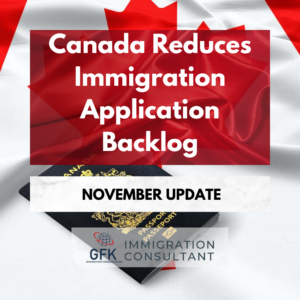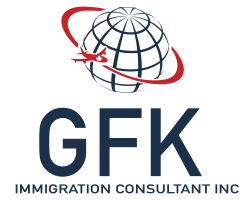Canada Reduces Immigration Application Backlog

Canada Reduces Immigration Application Backlog: The Immigration, Refugees and Citizenship Canada (IRCC) has provided its latest monthly backlog statistics, revealing that 2.4 million applications are under processing.
While significant progress has been made, over 1.05 millions of these exceed IRCC’s normal service standards entering backlog, a 3.73% drop compared to the previous month.
This article explores most recent official backlog trends, their implications, and IRCC’s strategies to improve processing timelines and manage demand effectively.
Table of Contents
Immigration Backlog: Key Insights
- Current Status: As of October 31, 2024, IRCC’s inventory stands at 2,406,000 applications, including permanent residence, temporary residence, and citizenship applications.
- Backlog Breakdown:
- Citizenship applications: 38,300 (increase of 0.52% as compared last month’s update).
- Permanent residency applications: 311,100 (up 1.93% as compared last month’s update).
- Temporary residence applications: 706,700 (reduced by 6.65% as compared to last month’s update).
Backlog Trends and Challenges
Canada Reduces Immigration Application Backlog
Temporary Residency
The highest drop was seen in temporary residency applications with reduction of 47,000 backlogged files.
Permanent Residency
Programs such as Express Entry and Provincial Nominee Programs are still processing applications above service standards, though slight increase (5,900) in backlog have been noted.
Applications Under Processing Within Service Standards
| Application Type | Within Service Standards (October 31, 2024) | Within Service Standards (September 30, 2024) | Month-on-Month Change |
|---|---|---|---|
| Citizenship | 185,800 | 184,800 | +0.54% |
| Permanent Residency | 519,200 | 510,800 | +1.64% |
| Temporary Residency | 644,900 | 658,000 | -1.99% |
| Total | 1,349,900 | 1,353,600 | -0.27% |
Impact of Backlogs on Applicants and Canada
- Labour Market Challenges: Delays in work permits disrupt industries reliant on skilled immigrants.
- Family Separation: Prolonged family sponsorship application timelines increase emotional strain.
- Economic Integration Delays: Many immigrants experience uncertainty, affecting their settlement prospects.
Future Projections
IRCC aims to reduce backlogs across all categories. However, temporary resident visas and study permits face mounting demand, requiring innovative measures like automation and additional staffing to meet future targets.
Projected Backlog by Category
| Category | Projected Backlog At The End Of December 2024 | Projected Backlog At The End Of November 2024 | Actual Backlog (October 2024) | IRCC’s October 2024 Projection |
|---|---|---|---|---|
| Citizenship | 16% | 16% | 17% | 17% |
| Express Entry | 20% | 20% | 19% | 15% |
| Provincial Nominee Program (PNP) | 20% | 20% | 25% | 20% |
| Spousal Sponsorship | 15% | 15% | 15% | 15% |
| Temporary Resident Visas (TRVs) | 61% | 59% | 74% | 61% |
| Study Permits | 26% | 37% | 33% | 32% |
| Work Permits | 40% | 44% | 46% | 7% |
Steps Forward for IRCC
- Scaling Resources: Hiring more immigration officers during peak times.
- Tech Integration: Automating simple application processes to improve efficiency.
- Policy Adjustments: Refining eligibility for temporary visas to balance demand.
While Canada’s immigration backlog reflects ongoing challenges, it also demonstrates IRCC’s resilience and commitment to improvement.
Applicants and stakeholders can expect continued updates as IRCC works toward streamlining operations.
Stay informed by visiting IRCC’s official updates.
Canada Reduces Immigration Application Backlog
GFK Immigration
Gboyega Esan RCIC R708591
Phone: +1 (647) 225-0092
#Explore #StudyPermit #CanadaImmigration #PostGraduateOpportunities #GFKImmigration #StayInCanada #Diploma #Canada #Student #internationalStudent #Study #Studypermit #immigrationcanada #canadaimmigration #immigratecanada #canadianimmigration #canadainmigration #immigrationtocanada #movetocanada #liveincanada #workincanada #studyincanada
